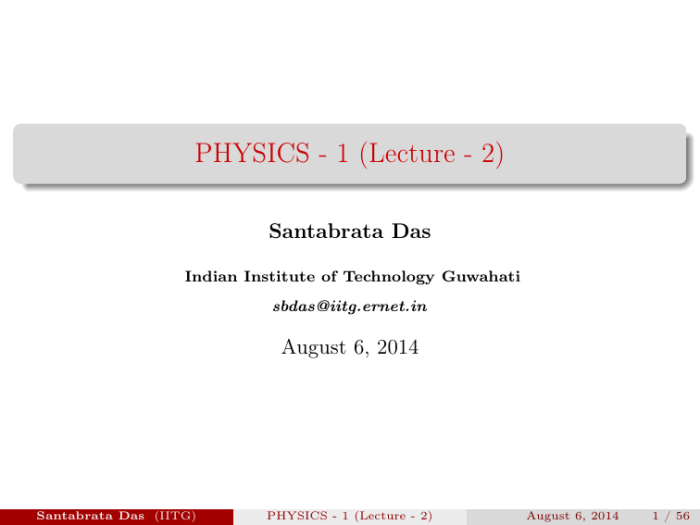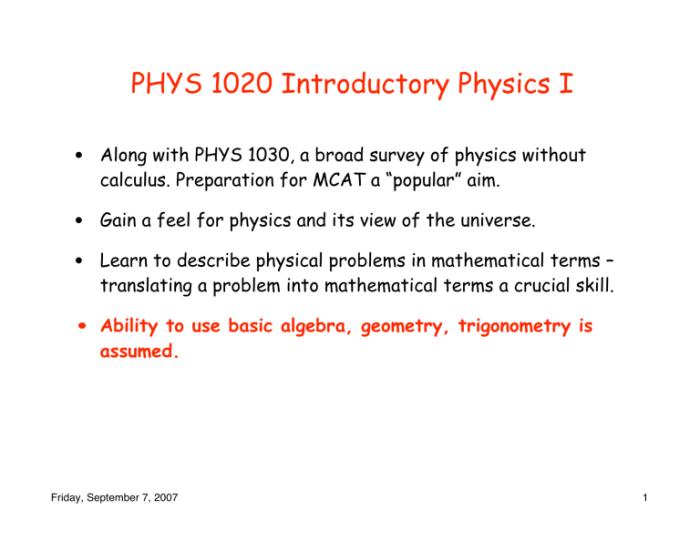Expert TA’s Intro to Physics provides a comprehensive overview of the role, responsibilities, and impact of expert teaching assistants (TAs) in physics education. This guide delves into the knowledge and skills required for effective TA performance, strategies for building positive TA-student relationships, and methods for assessing and evaluating TA effectiveness.
It also explores innovative ways to integrate expert TAs into physics curriculum and examines their impact on student learning outcomes.
Throughout this guide, we will explore the essential components of a successful expert TA program in physics, providing practical tips and best practices to enhance the teaching and learning experience for both TAs and students.
Expert Teaching Assistants (TAs) in Physics

Expert Teaching Assistants (TAs) in physics courses play a crucial role in enhancing student learning and fostering a positive learning environment. They are highly skilled individuals who possess a deep understanding of physics concepts and have received specialized training in teaching methodologies.Expert
TAs are responsible for assisting professors in delivering lectures, leading discussion sections, and providing individualized support to students. They work closely with students to clarify concepts, answer questions, and guide them through problem-solving exercises. By providing personalized attention, expert TAs help students overcome challenges and develop a strong foundation in physics.
Expert TA’s intro to physics may seem intimidating at first, but it’s like learning the d minor scale on the treble clef . Once you get the hang of it, you’ll find it’s not so hard after all. Just like in music, physics is all about understanding the patterns and relationships between different elements.
With a little practice, you’ll be able to tackle any physics problem like a pro.
Benefits of Expert TAs in Physics Classrooms
The presence of expert TAs in physics classrooms offers numerous benefits to students, including:
- Enhanced understanding of concepts:Expert TAs can break down complex concepts into smaller, more manageable chunks, making them easier for students to grasp.
- Improved problem-solving skills:TAs provide step-by-step guidance in solving problems, helping students develop logical thinking and analytical abilities.
- Personalized support:Expert TAs are available for one-on-one consultations, allowing students to receive individualized attention and support tailored to their specific needs.
- Enthusiasm for learning:TAs who are passionate about physics can inspire students and foster a positive learning environment.
Examples of Successful Implementations
Several universities have successfully implemented expert TA programs in physics, leading to improved student outcomes. For instance, the University of California, Berkeley’s Physics Teaching and Learning Center has a well-established TA training program that provides TAs with pedagogical training and ongoing support.
As a result, Berkeley’s physics students consistently report high levels of satisfaction with TA support.Another successful example is the University of Colorado Boulder’s Physics Education Research Group. This group has developed innovative teaching strategies and TA training programs that have led to significant gains in student learning.
By providing expert TAs with the necessary resources and training, universities can empower them to make a meaningful contribution to physics education.
Knowledge and Skills Required for Expert TAs in Physics

Expert TAs in Physics are the backbone of any physics department, providing invaluable support to students and faculty alike. To excel in this role, TAs must possess a comprehensive understanding of physics and a diverse set of skills, including communication, problem-solving, and teaching abilities.
Essential Knowledge and Skills
The foundation of an expert TA’s knowledge lies in a deep understanding of physics principles, including mechanics, electromagnetism, thermodynamics, and quantum mechanics. They must be able to apply these principles to solve complex problems and explain concepts clearly to students.
In addition to their physics knowledge, expert TAs possess strong communication skills, both written and verbal. They can effectively convey complex information to students, answer questions, and provide constructive feedback.
Problem-solving abilities are crucial for TAs, as they are often called upon to help students understand challenging concepts. Expert TAs can break down complex problems into smaller steps, identify key variables, and guide students towards solutions.
Finally, expert TAs possess strong teaching abilities. They can create engaging lesson plans, lead discussions, and use various teaching methods to cater to diverse learning styles.
Assessment and Evaluation
To ensure that TAs possess the necessary knowledge and skills, they undergo a rigorous assessment process. This may include written exams, oral presentations, and teaching demonstrations. Potential TAs are also evaluated on their communication, problem-solving, and teaching abilities during their training period.
Training and Development, Expert ta’s intro to physics
Training and development are essential for expert TAs to stay up-to-date on the latest physics research and teaching methods. Universities and colleges often provide workshops, seminars, and mentorship programs to help TAs enhance their skills.
Strategies for Effective TA-Student Interactions: Expert Ta’s Intro To Physics

Effective TA-student interactions are crucial in physics courses as they enhance the learning experience and foster a positive and productive learning environment. TAs play a vital role in supporting students’ understanding of complex concepts, providing individualized guidance, and creating an inclusive classroom atmosphere.
Building Positive Relationships
Building positive relationships between TAs and students is essential for effective interactions. TAs should:
- Be approachable and welcoming, creating a comfortable and open atmosphere for students to ask questions and seek assistance.
- Demonstrate respect for students’ perspectives and backgrounds, fostering a sense of belonging and inclusivity.
- Communicate clearly and effectively, using language that is accessible to students with diverse learning styles.
Fostering a Supportive Learning Environment
TAs can foster a supportive learning environment by:
- Providing timely and constructive feedback on students’ work, helping them identify areas for improvement.
- Creating opportunities for students to engage in active learning and problem-solving, encouraging critical thinking and collaboration.
- Establishing clear expectations and guidelines, ensuring that students understand the course requirements and expectations.
Assessment and Evaluation of Expert TAs in Physics

A comprehensive system for assessing and evaluating the performance of expert TAs in physics is crucial to ensure their effectiveness and provide opportunities for professional growth. The assessment should be based on key metrics and criteria that reflect the core responsibilities and skills required for expert TAs in physics.
Key Metrics and Criteria for TA Evaluation
Key metrics and criteria for evaluating TA effectiveness may include:
- Teaching skills: Lesson planning, delivery, communication, and engagement with students
- Subject matter expertise: Knowledge and understanding of physics concepts
- Communication and interpersonal skills: Ability to interact effectively with students, faculty, and peers
- Assessment and grading: Fairness, accuracy, and consistency in assessing student work
- Organization and time management: Ability to manage multiple tasks and meet deadlines effectively
- Professionalism and ethical conduct: Adherence to ethical guidelines and maintaining a professional demeanor
- Student feedback: Evaluation of TA performance based on student surveys and feedback
Methods for Providing Feedback and Support
Based on the evaluation results, TAs should receive constructive feedback and support to improve their performance. This can be provided through:
- Regular meetings with supervisors to discuss strengths, areas for improvement, and professional development opportunities
- Peer feedback and observation of teaching sessions
- Workshops and training programs on teaching methods, assessment techniques, and effective communication skills
- Mentoring and support from experienced TAs or faculty members
A comprehensive assessment and evaluation system, combined with targeted feedback and support, can help expert TAs in physics enhance their teaching skills, subject matter expertise, and overall effectiveness, ultimately contributing to improved student learning outcomes.
Integration of Expert TAs into Physics Curriculum and

Expert Teaching Assistants (TAs) in Physics can be effectively integrated into the physics curriculum in various ways to enhance student learning experiences.One innovative approach is to involve TAs in the development and delivery of hands-on laboratory activities. TAs with strong practical skills can guide students through experiments, troubleshoot technical issues, and provide real-time feedback.
This hands-on engagement allows students to develop their experimental skills and deepen their understanding of physics concepts.
Example: Collaborative Problem-Solving Sessions
Another effective strategy is to utilize TAs in collaborative problem-solving sessions. TAs can facilitate group discussions, guide students through complex problems, and provide individualized support. This approach fosters peer learning, improves communication skills, and promotes a deeper understanding of the material.
Essential Questionnaire
What are the benefits of having expert TAs in physics classrooms?
Expert TAs provide individualized support, enhance student understanding, foster a positive learning environment, and promote critical thinking skills.
What are the essential knowledge and skills required for expert TAs in physics?
Expert TAs should possess a deep understanding of physics concepts, effective communication skills, and a commitment to student success.
How can TAs effectively integrate into physics curriculum?
TAs can be integrated into curriculum through leading discussion sections, conducting labs, providing office hours, and developing supplemental materials.